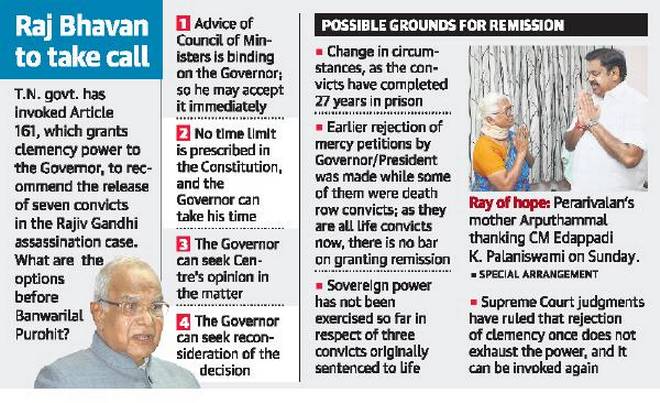Why in news?
Tamil Nadu Cabinet recommended to TN Governor that all 7 life convicts in the former Prime Minister Rajiv Gandhi assassination case be released.
What are the recommendations?

- The assassins release was recommended based on the power provided under Article 161 of the Constitution.
- Article 161 empowers the Governor to grant pardons and to suspend, remit or commute sentences of any person convicted of any offence against any law relating to a matter to which the executive power of the State extends.
- The decision followed the Supreme Court’s observation that the Governor shall be at liberty to decide on the mercy petition of Perarivalan, one of the 7 convicts, as deemed fit.
- Other six convicts had also pleaded to the Governor and the State government for remission of their sentences.
- To a question on the contention that the State government could not decide on a case investigated by a Central government agency, the government is of the view that the law is only interpreted by the authority concerned — the Supreme Court, the highest in hierarchy and the Supreme Court’s direction is clear.
A brief look on Rajiv Gandhi Assassination Case
- In October 1990 the plot to kill Former Prime Minister Rajiv Gandhi was first hatched in deep in the jungles of Jaffna, Sri Lanka.
- The chances of Congress (I) president Rajiv Gandhi returning to power were certain after the minority National Front government was facing survival uncertainties.
- For the extremist organization struggling for Tamil Eelam (LTTE), this meant a possible re-induction of the Indian Peace Keeping Force (IPKF) in Sri Lanka.
- LTTE decided that they should attack Mr.Gandhi while his security status was still that of an opposition leader and election campaigning would render him even more vulnerable.
- Rajiv Gandhi was assassinated on the night of May 21, 1991 at Sriperumbudur in Tamil Nadu by a woman suicide bomber, identified as Dhanu, at an election rally.
- The Special Investigative Team had named 41 accused in its charge sheet – including 12, who died in the blast and three who was absconding – before a TADA court in Chennai, 1998.
- In May 1999, the Supreme Court had upheld the death sentence of four, including Murugan, Santham, Perarivalan and Nalini, commuted the death sentence of three to life, and freed the remaining 19.
- In 2000, the death sentence of one of the accused S Nalini, was reduced to a life sentence by the then Tamil Nadu Governor, at the instance of then Congress president Sonia Gandhi.
- In 2014, the Supreme Court commuted the death sentence of Murugan, Santhan, and AG Perivalan to life.
- The convicts in the case - Nalini, Santhan, Murugan (Nalini’s husband), A.G. Perarivalan, Robert Payas, Jayakumaran, and Ravichandran —are serving life terms across various jails in Tamil Nadu.
- The convicts have been in jail for over 27 years.
- In 2014, the TN government took the decision to free the convicts, and requested the central government to convey its views within three days as the investigation in the case was done by CBI.
- The central government approached the Supreme Court and got a stay on the release proposal of the Tamil Nadu government.
- The court ruled that the convicts could only be released with the concurrence of the centre.
- The court also added that States cannot exercise suo motu the power to grant remission without any specific plea from convicts.
- In 2016, Tamil Nadu government wrote to Centre seeking its views on its decision to free them which was rejected by the Centre.
- However the Supreme Court, considering the plea of Perarivalan, decided to hear the government on the conspiracy and making of the belt bomb that killed former Prime Minister Rajiv Gandhi.
- The Supreme Court observed that the multi-agency probe into the larger conspiracy behind the assassination has not made much headway and seems to be endless.
- Supreme Court gave the Centre three months to decide the Tamil Nadu government’s proposal made in 2014 to remit the sentences of the seven life-term convicts.
- The Centre had told the apex court that it does not concur with the similar Tamil Nadu government's proposal to release the seven convicts in 2017.
- The reasons it stated were that remission of their sentence will set a dangerous precedent and have international ramifications.
- Finally, the Supreme Court asked the Tamil Nadu Governor to consider the mercy petition of Perarivalan.
Source: The Hindu
